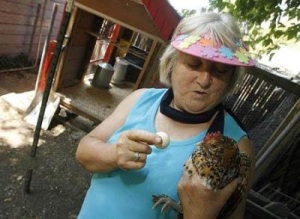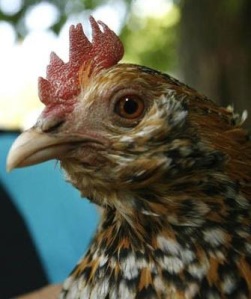 My Comments on this article below
My Comments on this article below
I could not believe the radio add I heard the other day. “Back yard bugs bugging you?” It goes on to say that if you buy some newfangled super chemical you won’t have to deal with bugs in your beautiful lawn. What?? I have a BEAUTIFUL green lawn because chickens are the highest nitrogen producing animal. My feathered patroll officers also eagerly find any weed in my lawn and eat it. How about bugs? What bugs? Any bug willing to poke his head up in my lawn becomes chicken feed. You want a beautiful green and bug free lawn. Own chickens! Give the environment a rest and stop dumping chemicals in the ground in order to achieve a fake beauty. Nature is beauty, harness the wonderful chicken and you receive many benefits.
The roosters do not need to be kept. As soon as they crow loud enough to bother the neighbors it is easy to get rid of them. That can be part of the ordinance. Or the owners that want to keep a rooster can put him in a short box or crate in the morning so he cant stand up to crow. I own chickens in my urban setting and am totally willing to jump through rooster hoops in order to have all the benefits. BTW. Chickens are a great canary in the coal mine in regards to bird born illnesses.
Article posted below.
Urban chickens – green pets or foul fowl?
Some residents in WVC and unincorporated S.L. County want to make it legal to raise backyard hens
By Jeremiah Stettler The Salt Lake Tribune
Article Last Updated: 08/11/2008 06:25:01 AM MDT
Bhakti Banning, holding Josephina and one of her eggs, is owner of three lovely female Bantam chickens, delights in educating others of the pluses of owning chickens at her home in SLC. Chicken owner enthusiasts took a self-guided tour of several city chicken coops run by residents of SLC that own chickens Saturday. (Leah Hogsten/The Salt Lake Tribune)
Bhakti Banning’s, lovely female Bantam chicken Josephina roosting. Chicken owner enthusiasts took a self-guided tour of several city chicken coops run by residents of SLC that own chickens Saturday. (Leah Hogsten/The Salt Lake Tribune)
As the Salt Lake Valley becomes more and more urban, a resurgence of rural living is scratching its way into the suburbs. Campaigns for looser chicken laws have hatched in at least two of the valley’s largest communities – unincorporated Salt Lake County and West Valley City – to make it legal to raise backyard hens. These efforts reflect a wider national trend, in which urban chicken ordinances are popping up in major cities from Honolulu to Houston to Baltimore. Marinda Coleman once harvested breakfast from her Millcreek Township backyard, collecting eggs from a dozen hens she had raised from 3-day-old chicks. She considered it healthy, humane and a much better alternative to trucking her food hundreds of miles across country. Then came county inspectors, responding to a neighbor’s complaint, who threatened Coleman with a class B misdemeanor and a $1,500 fine if she didn’t get rid of the hens. Chickens, they said, didn’t belong in her suburban neighborhood. County ordinance prohibits chickens on residential lots smaller than a half-acre. Coleman complied. But now she is trying to change that law with a campaign that will reach community councils from east-side Emigration Canyon to the secluded west-side mining town of Copperton. The Millcreek woman isn’t alone.
Kathryn Dunn is leading a similar charge in West Valley City, where chickens are allowed only in agricultural zones. Dunn hasn’t raised chickens before. But with food prices rising, concerns about salmonella and growth hormones making national headlines and a faith that encourages preparedness, Dunn says backyard hens make sense. “The older I get,” she said, “the more I see things happen in the world that [indicate] it would be prudent to be self-reliant.” The trend toward urban chickens already has spread across the Salt Lake Valley, with or without legal changes. IFA Country Stores sold 17,000 chickens last year from its three Salt Lake County stores – an estimated 20 percent jump in sales over the previous year. Those backyard hens have generated so much demand along the Wasatch Front, in fact, that the company’s Salt Lake City and Riverton stores have sold more chicks than any other location in the IFA chain, according to vice president of marketing, Brad Camp. “This is not an issue that is going to go away,” said KT LaBadie, the Albuquerque-based co-founder of the Web site http://www.urbanchickens.org. “The idea of a more sustainable city appeals to a lot of people.” West Valley City is drafting an ordinance that would allow urban chickens, under certain conditions. Owners may have to seek a permit, clean their coops regularly and keep their fowl a certain number of feet from nearby homes. Utah’s second-most-populous city also may give prospective chicken owners a discount on their permitting fees if they attend a class on how to be a responsible hen keeper. “These ordinances are to shape people into better chicken owners,” long-range planner Shane Smith said, “and give them a legitimate means to achieve those ends.”
The campaign has moved slower in Salt Lake County, where Coleman must appeal to the county’s 12 community councils for change – perhaps at a combined forum in August. Meanwhile, Mayor Peter Corroon is soliciting a report from the Salt Lake Valley Health Department on the implications of allowing suburban chickens into unincorporated neighborhoods. “I’m supportive of sustainable living and people being able to live off their own land,” he said, “but it has to be compatible with urban living.” Aimee McConkie, chair- woman of the Canyon Rim Community Council, insists those hens are compatible – so long as they are cared for properly. “If people are willing to comply with the laws and ordinances,” she asked, “then why not allow them to do this?” Dunn continues to push for change in West Valley City. She already has plans to paint a backyard shed red and white for her new coop.
jstettler@sltrib.com
Backyard-chicken laws Want to raise chickens in your backyard? It might take a law change if you live in West Valley City or unincorporated Salt Lake County – an effort that already has begun. Utah’s capital allows urban chickens.
Salt Lake City: Allows hens in residential neighborhoods, so long as owners obtain a yearly permit. Residents must pay $5 per animal, not to exceed $40 annually.
Salt Lake County: Allows chickens on residential properties larger than a half acre, but prohibits them on smaller lots.
West Valley City: Allows chickens only on agricultural properties.
Sources: Salt Lake City, Salt Lake County, West Valley City
